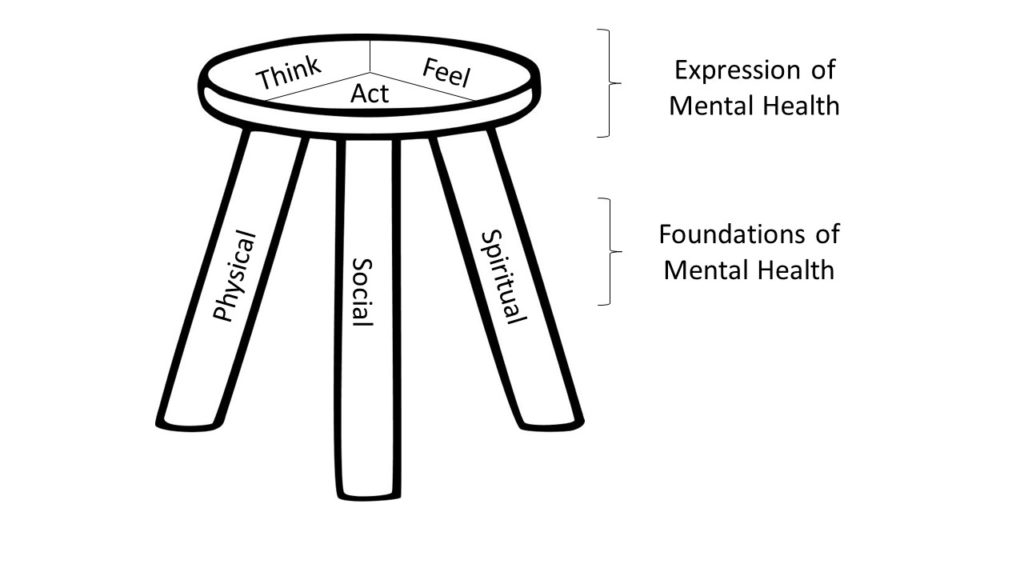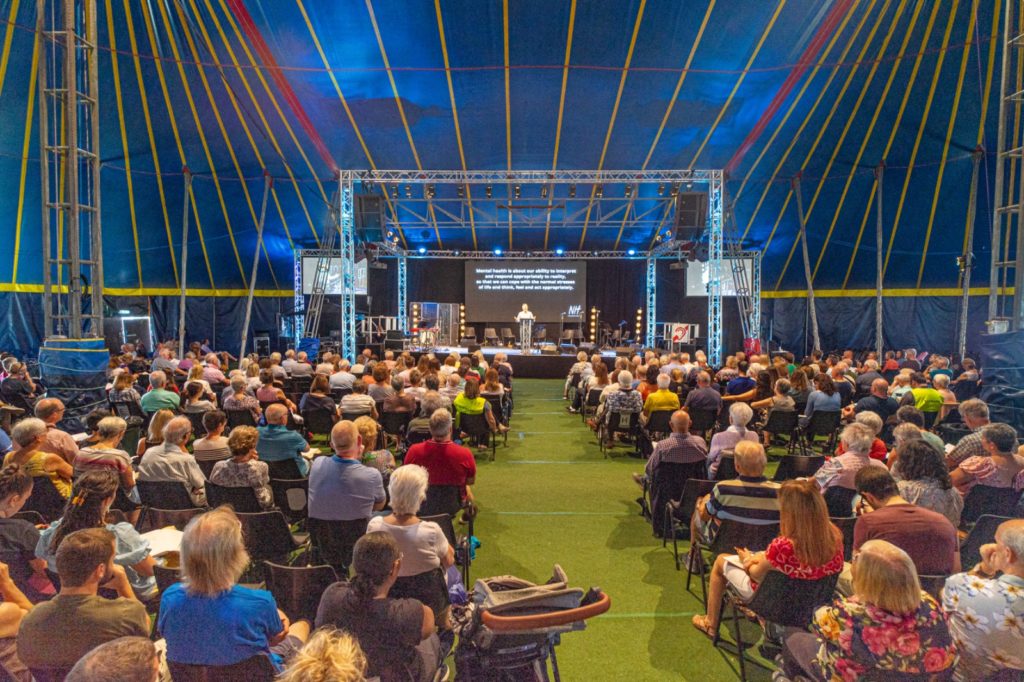Tuesday 9 August
With John Risbridger

Life had been difficult for a long time. I’d kept going, but I wasn’t sleeping well, my mood was swinging and at times I was feeling the kind of low that seems to cling to me all day. One morning I woke up and my stomach felt like someone had tied a knot in it; unusually I had zero energy and collapsed into bed and didn’t get up for 36 hours.
It passed and I went on; but a few months later Alison and I were walking by the sea which is something I love to do but after just a couple of hours I was shattered.
We stopped for a coffee and a scone and my stomach starting knotting up again. A few hours later I was in back in bed sleeping and sleeping. Something was obviously wrong. The following week I visited the GP and was signed off with stress-induced depression.
It was official: I was mentally ill. Some of you may feel that is an odd thing to hear from a platform. Others may be grateful to hear that from the platform. (Check out “Is it unspiritual to be depressed” by Paul Ritchie.)
Early in those hard weeks I read Psalms 42/3 (almost certainly they were originally one composition) and I lived in this Psalm day after day. It spoke to me. But even more importantly, it spoke for me in my pain and confusion. I’ve always loved the quote, attributed to Athanasius that while in most of scripture God speaks to us; in the Psalms he speaks for us. And these words spoke for me. Calvin describe the Psalms as an anatomy of the soul (there is not one feeling of human life that is not reflected there).
That was over four years ago now and, with excellent counselling, a year of so of medication and a wonderfully supportive wife and family, I’ve largely recovered. But I think it’s important for me to be honest on platforms like this and name it for what it is: a period of disturbingly low mood and depression for which I needed help, professional help and I am grateful for it.
I do that because Christians are often reluctant to talk about Mental illness – even though a 2015 Health Survey for England showed that one in four adults has a diagnosed mental illness at some point in their lives. This is not something for a fringe of society, this is mainstream. I don’t have figures for rest of the UK, but they are likely to be similar.
My own experience and my experience as a pastor tells me we need to break the silence and our New Horizon theme is a wonderful opportunity to do just that.
Before Psalm 42 some wider, but first let me set a few expectations:
- I’m not a Mental Health professional and I don’t have easy answers to depression or anxiety – still less for bi-polar or schizophrenia.
- I’m grateful for the input of friends who are Mental Health professionals who had a part in developing what I am going to share
- I’m not going to tell anyone to throw their pills away – brain chemistry undoubtedly is a significant factor in mental illness so it is often appropriate to seek and value medical input. I think as Christians we should be part of putting away the shame and stigma around using anti-depressants.
- Neither do I have some magic formula to prevent you from experiencing mental illness – not least because the dominant factors behind chronic mental illness are in fact genetic.
There are many attempts to define mental health and mental illness but the suggestions I’ve found most helpful say that mental health is about our ability to interpret and respond appropriately to reality so that we can cope with the normal stresses of life and think, feel and act appropriately.
Mental illness occurs when that ability breaks down significantly – e.g. depression; persistent anxiety; delusion, paranoia. And, while some of the categories we use to talk about Mental Health are not explicit in Scripture, we will see that it does both speaks to us and for us in these struggles of the mind.
Let’s begin at the beginning in Genesis 2:7 – which tells us that God made us ‘from the dust of the ground’ – so we are physical beings. It also tells us that distinctly human life comes from the breath of God himself – so we are also spiritual beings.
Or in the language of the Genesis 1, we are made in the image of God – but there’s something else in those verses. Read 1:26-7 – see that language “us/our/them/male/female”. So God is not a solitary being but a community who has made us for relationship – we are social beings. Father, Son and Holy Spirit. That is the God of the Bible. He is relationship in and of Himself.
We are created as physical, spiritual and social – but Genesis tells us that we are created for a certain kind of existence:
We are created to think meaningfully. In Genesis 1 God is speaking. And His words are not just sounds; they are meaningful – they correspond to reality, creating and defining it. And He addresses them to us because we are made with the capacity to think meaningfully.
We are created to feel authentically. At the end of creation we see God experiences pleasure/joy in His work 1:31. And He has made us in His image to experience pleasure and joy too – read 2:8-9a
We are created to act/behave responsibly/appropriately – God reveals Himself as someone who works, who creates, who acts and we are made in His image to work creatively in His world. Read 1:28.
Put these two together and we have a simple vision of human wellbeing – i.e. Mental Health – as a kind of three legged stool in which our Mental Health (our capacity to think meaningfully, feel authentically and behave responsibly) is the seat, resting on the three legs of our human make up (physical, spiritual, social).

Problems with our Mental Health can come from problems in any of the legs – and problems will arise, because Genesis 3 tells us that we don’t live in the ideal world but in a world spoiled and broken by human sin:
Physical – brain chemistry, genetics wider physical health problems can have a major impact on our Mental Health. If there’s too much or too little serotonin, dopamine or other neurotransmitters in our brain synapses then our ability to think meaningfully, feel authentically, act responsibly will be impacted adversely. We’re physical beings
Social – broken relationships, co-dependent or controlling relationships, abusive relationships, absence of relationships (loneliness) can all affect our MH. And in childhood development, where key relationships are lost, damaged or dysfunctional there is often a long effect on future Mental Health.
Spiritual – which is about being in a right relationship with God, dealing with the wrong views of God we have and dealing with the idols that displace God and distort the way we think.
So paying attention to our physical wellbeing (through diet, exercise, work and rest), our social relationships (through generosity, honesty, listening, forgiveness) and our relationship with God are all key for us if we want to do what we can to look after our mental health.

So with that background let’s enter the world of Psalm 42-3 a Psalm of Lament. There are about 60 of these poems in the Psalms in which the writer voices their complaint or question to God or pours out their grief to Him. They give us permission to bring our most untidy emotions to God – and they give us words to help us do that. And since they are His words to us, we can use them to take our complaints, questions and griefs to Him, knowing that He will not turn us away.
There was one Psalm that meant a lot to me (Psalm 88) which does not reach a resolution and it was God’s gift to me in dark days. There are 13 questions in this Psalm – and most of them come from a believer who feels far from God but longs for Him (42:1).
Why was he feeling these things? Well it’s hard to be too sure. The heading suggests he is a temple musician from Jerusalem (Sons of Korah) who has been taken – probably against his will – far away from the temple and is captive in hostile, unbelieving company (e.g. 2 Kings 14:14). But whatever the precise situation, this is a Psalm for any of us who feel far from God and confused by his ways.
John Goldingay identifies a recurring pattern in the Psalm which I think is very helpful. [
Releasing – Letting yourself go – e.g. v1-2, v6, 43:1. Facing the reality of how you feel and telling it to God as it really is.
Reflecting – Letting yourself think – e.g. So in v4 he remembers how he used to worship God in His temple, v8 he remembers how God’s love has directed him and the praise of God has sustained him
Regrouping – Pulling yourself together (can seem slightly harsh) – that’s what the refrain (addressed to himself) does each time – read v5. “Why are you downcast o my soul?”
It’s an immensely helpful pattern if we are going through difficulties – releasing, reflecting and regrouping. It doesn’t happen over night. I could take weeks or months. I think this is teaching us that we don’t need to stuff our emotions down but can express them to God – and then, in the light of His truth, speak back to them. And it’s reflected not only in each section but, to some degree, in the Psalm as a whole. Learning to question and even challenge his emotions.
Feeling far from God (1-5) (there is a strong element of release here.) And that experience is encapsulated by the first question (2) – “Where can I go and meet with God?”
He sees a deer running by, panting desperately for water; it holds a mirror to his own physical thirst which in turn opens a window for him onto the deeper thirst of his soul – a thirst for God (2). Yet in every sense it seems God is far away and his circumstances indicate that God has lost all interest in him (3a – feel the sadness). And so he releases his sadness to God.
But he reflects too: about God – the living and desirable God. And about his past – how good it had been to worship God and serve Him and how longs for those days again – read v4. And having let himself think, he has words to speak to himself – a moment of personal regrouping, or pulling himself together.
Read v5. “So, you son of Korah, why so downcast? Why so disturbed? Keep hope alive by investing it in the LORD! You can’t see it now but He will give you cause to praise Him again!”
The renewing of our mind is a lot to do with beginning to think the thoughts of the future. In Jesus Christ, the future has been revealed to us. In Jesus Christ, the Kingdom has invaded the present so awe begin to experience His power now.
But I am so thankful that the Psalm doesn’t stop there. I remember so vividly early in my own journey of depression the power of moving from v5-v6 (read 5– yes, yes, very good; that’s the right answer. But I can’t tell how much of a relief it was to read v6. My soul is still downcast. Such a relief.
Christians can be full of easy answers and unsolicited and rather trite advice when you’re depressed. I know, I’ve been there – especially if they’ve never been there themselves. It doesn’t help. Don’t try and fix people in a a 30 second conversation. Just put your arm around their shoulder and stand with them. You don’t have to fix them -that’s what God is going to do. But what this Psalm says is that God still has time for you when the right answers aren’t working and the trite advice rings hollow. And when friends walk away because it’s too hard to keep caring for you, you can keep talking to Him. This is precious.
Feeling confused by God (6-11) (Strong element of reflection)
A key question stands at the heart of this section (9a) – “Why have you forgotten me?” Sometimes God’s ways are so confusing… we don’t understand. But first he let’s himself go again and faces his emotions. “Therefore I will remember you.” That’s key. When we are downcast we usually want to forget God, but this poet knows better. This is the very moment we need to remember God, to reflect on what He is like, what He has done, how He has walked with us through better days, how He is in control even in difficult days.
But the confusion and the reflection are interweaved in the turbulent stream of consciousness that follows.
V7 – imagine him in the hills of Hermon, standing beside a crashing waterfall, whose waters feed into the River Jordan. And the thunderous noise and churning waters echo the chaos and turmoil of his heart – 7a.
The ‘deep’ is the sea and in Hebrew thinking it was a pace of chaos and restlessness and that’s what his heart feels like, with waves relentlessly crashing over him (7b), with no time to regain his breath between each one so that he feels he is drowning beneath the breakers – a classic metaphor for depression.
But then notice whose waterfall and whose breakers they are? They are God’s. It’s so tempting when our lives are full of pain and questions to try and get God off the hook and think it’s nothing to do with Him – as if this disaster one just slipped through when He wasn’t looking.
But once you do that you’re up the creek with no paddle in site – for if God has lost control, you’ve lost the only hope you had left. This does not imply God delighting to inflict pain on us but still He is mysteriously and gloriously sovereign. And he has experienced God’s gracious control in the past v8 – which David Wilcock suggests is best read as ‘used to’.
This is the heart of his confusion. Given what he has seen of God’s care in the past what on earth is happening now? And then he does the best thing you can do with a question like that – he addresses it frankly to God (9 -10).
“God is remote enough for him to feel deserted, yet near enough for him to speak to!”
He still feels the confusion, but the reflection has been good for him. And so once again he is ready to regroup – if God has cared for him in the past, surely he will do so in the future so v11.
Finding hope in God (43:1-5) (Strong element of regrouping)
The questioning is still there in this section – v2 “Why have you rejected me?” But this section as a whole is more positive. He still lets it all hang out, but he’s starting to push through the venting and to use his convictions about God to ‘pushback’ on his negative emotions. Perhaps God will do something and vindicate him (1) and though he complains, it is to God his stronghold (2). You can feel faith beginning to rise.
And his reflection leads him to think about God’s light and truth – which are undiminished for God has not changed! So surely they will lead him back to the place of His presence – read vv3 & 4. God is still the same. Nothing has changed in heaven. He is still there.
The Psalm which began with the longing to be in the place of worship finishes with the anticipation of being there again. Whether that was a physical return to the temple, or a true experience of His presence in exile is not for us to know.
But what we do know is that, having released that torrent of emotion as he felt far from God, having reflected on the care and control of God despite his confusion, he is now beginning to find hope in God. So he is in a place to regroup one more time (5 – firm).
Releasing: Reflecting: Re-grouping – not just once but over and over, as God’s presence penetrates the layers of grief and sadness. God is not hurrying you. He has got all the time of eternity.
That is the extraordinary journey of this Psalm – and it’s a journey we are invited to make when our hearts are broken, when tears are our constant food and we need to lament a God who seems far away.
It’s a Psalm that gives to us:
Permission to speak – releasing to God our deepest emotions and most uncomfortable questions, freely and without fear of being rejected.
Encouragement to think – learning that when we are confused by God, we can still remember and reflect on Him. There is so much about God and his ways that we don’t understand but we cling to what we do know: that He is the living God, our rock, our stronghold and the lover of our souls.
Words to address to ourselves as well as to God – words that help us regroup; words to reorientate us to the God of salvation, the God of new beginnings who has not finished with us yet and who still has so much to show us that will lead us to worship him again. And space to go around the cycle again and again – there’s no hurry.
But perhaps most wonderful of all, is to realise that Jesus too prayed these Psalms of Lament – and he did so knowing not only the sense but the full, terrible reality of being forsaken by God. When He took up the lament of Psalm 22.
From the cross Jesus, the ‘Singing Saviour’, enters the place of lament with us as he cries, “My God my God, why have you forsaken me?”. And as that cry that pierced the heavens echoes on in the chaos of our troubled minds and broken hearts, we see that He was forsaken so that we would never be; that He was rejected so that we might be brought home; that He died, the righteous for the unrighteous to bring us home to God.
He sang the Psalms of lament so that we might sing the song of salvation. The suffering of His death and the victory of His resurrection guarantee that the time for lamenting will one day be over and that He will bring us to His New Creation in which every tear is wiped from our eyes and there is no more death, or mourning or crying or pain.
And that is the best news and the surest hope for troubled minds.
